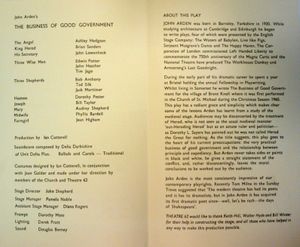Difference between revisions of "DD095908"
From WikiDelia
Jump to navigationJump to search(No difference)
|
Revision as of 15:38, 14 March 2012
DD095908 is the inside of the theatre programme for a 1965 production of the play The Business of Good Government for which Delia created music and effects.
The front cover of the programme is DD095849.
Transcript
John Arden's
THE BUSINESS OF GOOD GOVERNMENT
The Angel Ashley Hodgson
King Herod Brian Sanders
His Secretary John Lowenheck
Three Wise Men Edwin Potter
John Heather
Tim Jago
Three shepherds Bob Anthony
Ted Silk
Jack Mortimer
Hostess Dorothy Pester
Joseph Bill Taylor
Mary Audrey Shepherd
Midwife Phyllis Bardell
Farmgirl Jean Higham
Production by Ian Cotterell
Soundscore composed by Delia Derbishire [sic]
of Unit Delta Plus. Ballads and Carols -- Traditional
Costumes designed by Ian Cotterell, in conjunction
with Jean Golder and made under her direction by
members of the Church and Theatre 62
Stage Director John Shepherd
Stage Manager Pamela Noble
Assistant Stage Manager Diana Rogers
Prompt Dorothy Moss
Lighting Derek Pratt
Sound Douglas Berney
ABOUT THIS PLAY
John Arder was born in Barnsley, Yorkshire in 1930. While
studying architecture at Cambridge and Edinburgh he began
to write plays, four of which were presented by the English
Stage Company: The Waters of Babylon, Live like Pigs,
Serjeant Musgrave's Dance and The Happy Haven. The Cor-
poration of London commissioned Left Handed Liberty to
commemorate the 750th anniversary of the Magna Carta and the
National Theatre have produced The Workhouse Donkey and
Armstrong's Last Goodnight.
During the early part of his dramatic career he spent a year
at Bristol holding the annual Fellowship in Playwriting.
Whilst living in somerset he wrote The Business of Good Govern-
ment for the village of Brent Knoll where it was first performed
in the Church of St. Michael during the Christman Season 1960.
This play has a radiant grace and simplicity which makes clear
some of the lessons Arden has learnt from a study of the
mdieval stage. Audiences may be disconcerted by the treatment
of Herod, who is not seen as the usual medieval monster
‘out-Heroding Herod’ but as an astute ruler and politician—
As Dorothy L. Sayers has pointed out he was not called Herod
the Great for nothing. As the title suggests, this play goes to
the heart of his current preoccupations: the very practical
business of good govenment and the relationship between
principle and expediency. But Arden never takes sides or paints
in black and white, he gives a straight statement of the
conflict, and, rather disconcertingly, leaves the moral
conclusions to be worked out by the audience.
John Arden is the most consistently impressive of out
contemporary playrights [sic]. Recently Tom Milne in the Sunday
Times suggested that ‘The modern theatre has had its poets
and it has its dramatists, but in John Arden it has acquired
its first dramatic poet since—well, let's be rash—the days
of Shakespeare’.
Theatre 62 would like to thank Keith Hill, Walter Hyde and Bill Winter
for their help in constructing the stage, and all those who have helped in
any way to make this production possible.
